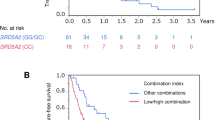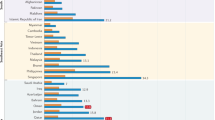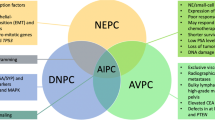Abstract
Background:
Organic anion-transporting polypeptides (OATPs) encoded by SLCO mediate the cellular uptake of many compounds, including androgens. SLCO1B3 and SLCO2B1 are polymorphic, and single-nucleotide polymorphisms of those genes alter androgen transport efficiency. We aimed to investigate the association between genetic variations in SLCOs and the progression to castration-resistant prostate cancer (CRPC).
Methods:
We studied the progression to CRPC for the SLCO1B3 rs4149117 and SLCO2B1 rs12422149 genotypes in 87 prostate cancer patients who received androgen deprivation therapy (ADT). Data were analyzed using the χ2 test, Kaplan–Meier survival analysis and Cox proportional hazard model.
Results:
SLCO3B1 genotypes were not significantly associated with the time to progression (TTP); however, patients carrying the active androgen transport SLCO2B1 genotype (GG allele) exhibited a median TTP that was 7 months shorter than that of patients with impaired androgen-transporting activity SLCO2B1 polymorphisms (GA/AA alleles) (10.0 vs 17.0 months, P=0.004). Active androgen transport genotypes of SLCO2B1 (GG allele) occurred more frequently in African and Caucasian populations than in Japanese and Han Chinese populations (P<0.001).
Conclusions:
These data suggest that SLCO2B1 rs12422149 variants could provide prognostic value for prostate cancer patients treated with ADT and influence ethnic differences in response to ADT. Active androgen import may be one of the underlying mechanisms of resistance to ADT, and androgen-transporting systems could provide novel biomarkers and targets for CRPC treatment.
This is a preview of subscription content, access via your institution
Access options
Subscribe to this journal
Receive 4 print issues and online access
$259.00 per year
only $64.75 per issue
Buy this article
- Purchase on Springer Link
- Instant access to full article PDF
Prices may be subject to local taxes which are calculated during checkout

Similar content being viewed by others
References
Tannock IF, de Wit R, Berry WR, Horti J, Pluzanska A, Chi KN et al. TAX 327 Investigators. Docetaxel plus prednisone or mitoxantrone plus prednisone for advanced prostate cancer. N Engl J Med 2004; 351: 1502–1512.
Petrylak DP, Tangen CM, Hussain MH, Lara PN Jr, Jones JA, Taplin ME et al. Docetaxel and estramustine compared with mitoxantrone and prednisone for advanced refractory prostate cancer. N Engl J Med 2004; 35: 1513–1520.
de Bono JS, Logothetis CJ, Molina A, Fizazi K, North S, Chu L et al. Abiraterone and increased survival in metastatic prostate cancer. N Engl J Med 2011; 364: 1995–2005.
de Bono JS, Oudard S, Ozguroglu M, Hansen S, Machiels JP, Kocak I et al. TROPIC Investigators. Prednisone plus cabazitaxel or mitoxantrone for metastatic castration-resistant prostate cancer progressing after docetaxel treatment: a randomised open-label trial. Lancet 2010; 376: 1147–1154.
Golshayan AR, Antonarakis ES . Enzalutamide: an evidence-based review of its use in the treatment of prostate cancer. Core Evid 2013; 8: 27–35.
Hafeez S, Parker C . Radium-223 for the treatment of prostate cancer. Expert Opin Investig Drugs 2013; 22: 379–387.
Kantoff PW, Higano CS, Shore ND, Berger ER, Small EJ, Penson DF et al. Sipuleucel-T immunotherapy for castration-resistant prostate cancer. N Engl J Med 2010; 363: 411–422.
Attar RM, Takimoto CH, Gottardis MM . Castration-resistant prostate cancer: locking up the molecular escape routes. Clin Cancer Res 2009; 15: 3251–3255.
Chen CD, Welsbie DS, Tran C, Baek SH, Chen R, Vessella R et al. Molecular determinants of resistance to antiandrogen therapy. Nat Med 2004; 10: 33–39.
Fujimoto N, Miyamoto H, Mizokami A, Harada S, Nomura M, Ueta Y et al. Prostate cancer cells increase androgen sensitivity by increase in nuclear androgen receptor and androgen receptor coactivators; a possible mechanism of hormone-resistance of prostate cancer cells. Cancer Invest 2007; 25: 32–37.
Foley R, Marignol L, Keane JP, Lynch TH, Hollywood D . Androgen hypersensitivity in prostate cancer: molecular perspectives on androgen deprivation therapy strategies. Prostate 2011; 71: 550–557.
König J, Seithel A, Gradhand U, Fromm MF . Pharmacogenomics of human OATP transporters. Naunyn Schmiedebergs Arch Pharmacol 2006; 372: 432–443.
Hamada A, Sissung T, Price DK, Danesi R, Chau CH, Sharifi N et al. Effect of SLCO1B3 haplotype on testosterone transport and clinical outcome in Caucasian patients with androgen-independent prostatic cancer. Clin Cancer Res 2008; 14: 3312–3318.
Yang M, Xie W, Mostaghel E, Nakabayashi M, Werner L, Sun T et al. SLCO2B1 and SLCO1B3 may determine time to progression for patients receiving androgen deprivation therapy for prostate cancer. J Clin Oncol 2011; 29: 2565–2573.
Pressler H, Sissung TM, Venzon D, Price DK, Figg WD . Expression of OATP family members in hormone-related cancers: potential markers of progression. PLoS One 2011; 6: e20372.
Wright JL, Kwon EM, Ostrander EA, Montgomery RB, Lin DW, Vessella R et al. Expression of SLCO transport genes in castration-resistant prostate cancer and impact of genetic variation in SLCO1B3 and SLCO2B1 on prostate cancer outcomes. Cancer Epidemiol Biomarkers Prev 2011; 20: 619–627.
Sharifi N, Hamada A, Sissung T, Danesi R, Venzon D, Baum C et al. A polymorphism in a transporter of testosterone is a determinant of androgen independence in prostate cancer. BJU Int 2008; 102: 617–621.
Fukagai T, Namiki TS, Carlile RG, Yoshida H, Namiki M . Comparison of the clinical outcome after hormonal therapy for prostate cancer between Japanese and Caucasian men. BJU Int 2006; 97: 1190–1193.
Holmes L Jr, Chan W, Jiang Z, Ward D, Essien EJ, Du XL . Impact of androgen deprivation therapy on racial/ethnic disparities in the survival of older men treated for locoregional prostate cancer. Cancer Control 2009; 16: 176–185.
Tsujimoto M, Hirata S, Dan Y, Ohtani H, Sawada Y . Polymorphisms and linkage disequilibrium of the OATP8 (OATP1B3) gene in Japanese subjects. Drug Metab Pharmacokinet 2006; 21: 165–169.
Smith NF, Marsh S, Scott-Horton TJ, Hamada A, Mielke S, Mross K et al. Variants in the SLCO1B3 gene: interethnic distribution and association with paclitaxel pharmacokinetics. Clin Pharmacol Ther 2007; 81: 76–82.
Miura M, Satoh S, Inoue K, Kagaya H, Saito M, Inoue T et al. Influence of SLCO1B1, 1B3, 2B1 and ABCC2 genetic polymorphisms on mycophenolic acid pharmacokinetics in Japanese renal transplant recipients. Eur J Clin Pharmacol 2007; 63: 1161–1169.
Laitinen A, Niemi M . Frequencies of single-nucleotide polymorphisms of SLCO1A2, SLCO1B3 and SLCO2B1 genes in a Finnish population. Basic Clin Pharmacol Toxicol 2011; 108: 9–13.
Taguchi M, Ichida F, Hirono K, Miyawaki T, Yoshimura N, Nakamura T et al. Pharmacokinetics of bosentan in routinely treated Japanese pediatric patients with pulmonary arterial hypertension. Drug Metab Pharmacokinet 2011; 26: 280–287.
Inatomi H, Katoh T, Kawamoto T, Matsumoto T . NAT2 gene polymorphism as a possible marker for susceptibility to bladder cancer in Japanese. Int J Urol 1999; 6: 446–454.
Ikuyama T, Hamasaki T, Inatomi H, Katoh T, Muratani T, Matsumoto T . Association of vitamin D receptor gene polymorphism with renal cell carcinoma in Japanese. Endocr J 2002; 49: 433–438.
Hamasaki T, Inatomi H, Katoh T, Aono H, Ikuyama T, Muratani T et al. N-acetyltransferase-2 gene polymorphism as a possible biomarker for prostate cancer in Japanese men. Int J Urol 2003; 10: 167–173.
Mottet N, Bellmunt J, Bolla M, Joniau S, Mason M, Matveev V et al. EAU guidelines on prostate cancer. Part II: Treatment of advanced, relapsing, and castration-resistant prostate cancer. Eur Urol 2011; 59: 572–583.
Cooperberg MR, Hinotsu S, Namiki M, Ito K, Broering J, Carroll PR et al. Risk assessment among prostate cancer patients receiving primary androgen deprivation therapy. J Clin Oncol 2009; 27: 4306–4313.
Scher HI, Sawyers CL . Biology of progressive, castration-resistant prostate cancer: directed therapies targeting the androgen-receptor signaling axis. J Clin Oncol 2005; 23: 8253–8261.
Dehm SM, Schmidt LJ, Heemers HV, Vessella RL, Tindall DJ . Splicing of a novel androgen receptor resistance. Cancer Res 2008; 68: 5469–5477.
Guo Z, Yang X, Sun F, Jiang R, Linn DE, Chen H et al. A novel androgen receptor splice variant is up-regulated during prostate cancer progression and promotes androgen depletion-resistant growth. Cancer Res 2009; 69: 2305–2313.
Steinkamp MP, O'Mahony OA, Brogley M, Rehman H, Lapensee EW, Dhanasekaran S et al. Treatment-dependent androgen receptor mutations in prostate cancer exploit multiple mechanisms to evade therapy. Cancer Res 2009; 69: 4434–4442.
Shiota M, Yokomizo A, Fujimoto N, Naito S . Androgen receptor cofactors in prostate cancer: potential therapeutic targets of castration-resistant prostate cancer. Curr Cancer Drug Targets 2011; 11: 870–881.
Stanbrough M, Bubley GJ, Ross K, Golub TR, Rubin MA, Penning TM et al. Increased expression of genes converting adrenal androgens to testosterone in androgen-independent prostate cancer. Cancer Res 2006; 66: 2815–2825.
Montgomery RB, Mostaghel EA, Vessella R, Hess DL, Kalhorn TF, Higano CS et al. Maintenance of intratumoral androgens in metastatic prostate cancer: a mechanism for castration-resistant tumor growth. Cancer Res 2008; 68: 4447–4454.
Cai C, Chen S, Ng P, Bubley GJ, Nelson PS, Mostaghel EA et al. Intratumoral de novo steroid synthesis activates androgen receptor in castration-resistant prostate cancer and is upregulated by treatment with CYP17A1 inhibitors. Cancer Res 2011; 71: 6503–6513.
Acknowledgements
We thank Ms Hisami Aono for her technical assistance in genomic DNA extraction, PCR and DNA sequencing.
Author information
Authors and Affiliations
Corresponding author
Ethics declarations
Competing interests
The authors declare no conflict of interest.
Rights and permissions
About this article
Cite this article
Fujimoto, N., Kubo, T., Inatomi, H. et al. Polymorphisms of the androgen transporting gene SLCO2B1 may influence the castration resistance of prostate cancer and the racial differences in response to androgen deprivation. Prostate Cancer Prostatic Dis 16, 336–340 (2013). https://doi.org/10.1038/pcan.2013.23
Received:
Revised:
Accepted:
Published:
Issue Date:
DOI: https://doi.org/10.1038/pcan.2013.23
Keywords
This article is cited by
-
Current Status and Future Direction to Address Disparities in Diversity, Equity, and Inclusion in Prostate Cancer Care
Current Oncology Reports (2023)
-
Epidemiology and genomics of prostate cancer in Asian men
Nature Reviews Urology (2021)
-
Germline polymorphisms associated with impaired survival outcomes and somatic tumor alterations in advanced prostate cancer
Prostate Cancer and Prostatic Diseases (2020)
-
Loss of exogenous androgen dependence by prostate tumor cells is associated with elevated glucuronidation potential
Hormones and Cancer (2016)



